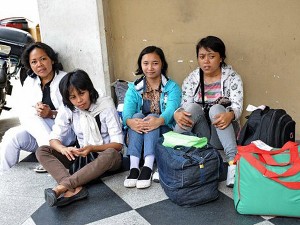
Newly arrived domestic helpers from Indonesia wait for their transportation to a maid agency after going through medical check in Singapore on March 6. AFP
SINGAPORE—Singapore’s decision to grant foreign maids a weekly day off was welcomed Tuesday by social workers and rights groups, but some employers grumbled and critics said the move falls short of international labor standards.
While Singapore is proud of its squeaky-clean image and widely admired for its economic development, it has been regularly criticized for its treatment of foreign workers.
Announcing the change, Minister of State for Manpower Minister Tan Chuan Jin said Monday the mandatory weekly rest day would apply to maids whose work permits are issued or renewed from January 1, 2013.
Employers who need the services of their maids on their rest day must compensate them.
Human Rights Watch (HRW) described the rest day as an “important reform”.
But the New York-based watchdog said the move, which came after years of lobbying by welfare groups, still falls short of international standards as it will take effect only in 2013 and does not offer other forms of labor protection.
More than 200,000 women from impoverished villages in Indonesia, the Philippines, Sri Lanka and India work as maids in Singapore. Some do not get a single day off during their first two-year contract.
A study carried out by Singapore migrant welfare groups and funded by the International Labor Organization showed that maids in the city-state work an average of 14 hours daily while only 12 percent have at least one day off a week.
Foreign maids typically earn Sg$300-450 ($238-357) a month and the employer has to pay the government a monthly levy of Sg$265 per maid.
“Many women in such situations find it difficult to cope with the social isolation and demands of the job,” said social worker Bridget Tan, founder of the private group Humanitarian Organization for Migration Economics.
“As a result, many of them suffer from anxiety, depression and loneliness.” Tan cited the case of a 19-year-old Indonesian helper who was recently jailed for killing an elderly widow because she was unable to cope with her employer’s demands and constant scolding.
Nisha Varia, senior women’s rights researcher at HRW, said a day off “is critical for a domestic worker’s physical, mental, and emotional well-being”.
“But this important reform should go into effect this year and apply to all domestic workers and their current contracts,” she added.
One Singaporean employer, banker Jacqueline Ng, expressed concern that some maids could abuse their freedom. She said she had to send an Indonesian maid home recently after she contracted a venereal disease.
Ng said her maid, who did not have a regular day off, had refused to say how she got the disease.
“Can you imagine if she has a day off. What will happen?” she said.
“It’s not that we are inhumane, but they will be very difficult to control.”
Foreign maids play a crucial social and economic role in Singapore, where most couples have to work to cope with the high cost of living and where the elderly population is rising fast.
Businesswoman Poon Boon Eng told the Straits Times newspaper that the new rule “is really bad news for women who are working”.
“I need to rest on Sundays too,” she said, adding that she would rather compensate her helper for a foregone rest day.
But Trina Liang-Lin, president of the Singapore Committee for UN Women, said she hoped domestic workers would give up a rest day in return for cash compensation only if that was their “own choice”.
HRW said Singapore’s labor-protection rules lag behind places like Hong Kong, which also has many migrant workers but where maids are already given a day off every week.